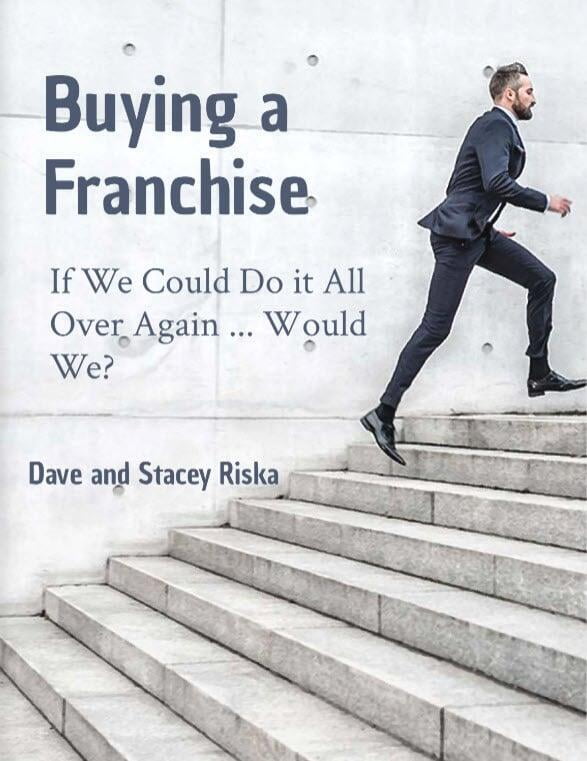
We’re on a little bit of a rant and here's what happened. We were talking to a franchisee candidate who was really interested in owning a business. He was currently in a job that he hated and a common mantra that we hear all the time. All the typical reasons. I hate my boss, I hate my company. I know I'm next on the chopping block for layoffs, and if I'm gonna work this hard why should I do it building somebody else's wealth instead of mine? The person that I was talking to was very open to exploring franchises because they knew that since they had never owned a business before, franchising made a lot of sense. A proven system where you can ramp up quickly. The candidate that I talked to really fit into one of what we call the eight Fs … it was the fallacy of job security.
So as I continue the conversation with this candidate, and I asked them if they're looking at business ownership, what is the most important criteria to you in having a successful business? The answer was, well, Stacey, if I'm gonna own a business I must make my full salary on day one in this business. So the question … is this realistic?
It’s a good question and generally people coming out of the corporate world they're coming out having had a salary for a very long time. They're very used to that money coming in on a regular basis. For that type of expectation, for them, it's not un-unrealistic only in that they've never really been in business before, so mostly they really don't know what to expect.
I want to start off with a good piece of information regarding this statement, and that is when you're evaluating franchises and you feel like this is you need to replace your income one of the things about buying a franchise that's really nice is there's something called an FDD (Franchise Disclosure Document). We have been covering the FDD in our previous content where we've actually gone through and kind of reviewed 13 of the items in the FDD. If your looking at a franchise be sure to review those.
Continuing forward, the reality of it is Item 19 in the FDD spells out for you from the results of other franchises in that franchise system, what some of the average net incomes are for those that are operating those franchises. Now, here's the thing. Number one, depending on the franchise that you choose, you may never replace your current income. I mean, if you're an attorney or something like that and you're used to making the large double six-digit income, then it's not realistic at all to think that you're going to come in and buy some franchises and replace that income, at least in the short term. So this is a primary reason why you need to work with someone like us if truly one of your criteria is to replace that income as quickly as you can. It's also going to limit some of the franchise choices that you can choose for.
I mean, there are franchises out there that realistically that you couldn't replace your income necessarily, and they're not really designed for quick income replacement. So for instance, like some of the real estate ones are more fix and flip it takes time and it will likely take two, three months, four months or more before you flip your first house. If you do that, you have no income for two or three months minimum. If you're lucky, you could replace your income in the first year, so we’re not going to say it's not possible, but really doing it from day one probably isn't that realistic. Generally, when you go into acquiring a franchise, the franchise has an investment schedule they give you, and part of their schedule includes operating money to pay you during your ramp-up phase. Now, that is not income, that is borrowed money that you're using to pay yourself an income from during that ramp-up phase, you hope to recover that income as quickly but the reality of it is that the chances are in year one it's gonna be difficult to replace that income.
Now, I want to make a disclaimer here. We are not allowed to make income claims under the guidelines of being a franchise placement specialist. So it's really important that regardless of what anybody tells you, you really need to dig deep into that FDD and figure out if it is even possible to replace my income at all with a particular franchise. If so, maybe during the due diligence phase of your investigation when you're talking to other franchisees, this would be a good question to ask other franchisees. How quickly did you ramp up your business and replace your income, whatever theirs was from wherever they came from? How quickly did they replace their income? You can ask that kind of question to other franchisees of that system, but we cannot suggest to you that you're going to be replacing your income when you acquire any franchise.
So if you are in a situation where you're in a job and you're thinking that you might want to leave to start a business, but you really do need to replace your income, the ultimate question is it realistic to make six figures on day one? The answer is, well, maybe. You need to look at the FDD, but let me challenge that a little bit. What if maybe you were able to make $75,000 instead of a hundred in your first year, because you're ramping up your business, but by the end of year two, you're making $200K or $250K. Can you live with that result? So you really have to ask yourself, what do you need today? But ultimately, what do you need long-term? Because you're building a business as a long-term investment and an asset. So now we're kind of going to play devil's advocate as well, aren't there some businesses that you can be cash flow positive on day one?
Without making earnings claims there are franchise opportunities out there that can provide you with cash flow right when you come out of the gates. However, a lot of that is highly dependent on things like territory. You could be in a territory that makes your franchise a seasonal business and you start out and you have rain for three months and you can't do work. So there are a lot of factors that can play into any type of business income regardless of franchise or no franchise. What we will say is that there are opportunities and a lot of franchises to wrap ramp your income up very quickly ... it may just not be from day one.
Well, we have seen some concepts that are very impressive, the ones that are very strong in marketing and have kind of membership or recurring revenue-based concepts. So maybe think of fitness where you're selling memberships to a gym or some kind of boutique fitness concept. We have seen concepts where they sell out the memberships even before the grand opening. So you are cash flow positive on day one or concepts like mosquito, tick and flea spraying because you're getting those contracts upfront even before you go out and do the initial spraying. So there are kinds of concepts that can bring in cash flow very quickly, but there aren’t any guarantees to you personally, but Item 19 will answer a lot of those questions. Doing your due diligence with other franchisees will certainly give you clarity on the numbers.
Let's dive a little bit deeper. The candidate that I was talking to kind of got it right and they were like, well if I can't make my numbers on day one in a franchise, then I'll just go look at an established business. I'll just buy an established business and I'll get my numbers on day one.
Well, a lot of times when you go to acquire an existing business and they already have a book of clients you're likely paying a premium for that. If you're paying that premium, unless you're paying cash for the whole thing, then you're probably gonna be borrowing money. The reality of it is that, yes, you might be cash flow positive from the business perspective, but you also may be paying interest on a loan for that premium that you paid for that existing business. That's if you're lucky.
What we found from looking at existing businesses, number one, when you're buying an existing business there is no FDD (Franchise Disclosure Document). In addition, there's nobody out there to represent that the numbers that you're seeing are really truthful and accurate. You have to figure this out on your own. What ends up happening is you really have to think about it. If it's this good, then why is this person selling the business? Many times that comes true, meaning that there was something under the hood that wasn't disclosed properly necessarily. Or maybe they're asking for such a large premium, which we see a lot of times in very cash-flow rich businesses that it's not that you won't see those numbers, but you still won't see them in true form until year two or year three, because you're paying interest on a loan for the premium. You had to pay for that type of business.
So again, we can't make income claims on any kind of business, but what we can say clearly is that an existing business does not have an FDD. Meaning there's no FTC overseeing those numbers that you're looking at to even validate if they really are true and that those are the numbers you could expect to get after you purchase that business.
So, there are definitely pros and cons to looking at an existing business. We prefer to lead candidates to those kinds of concepts when it makes a smart strategic decision to snap onto a business that's already in place. So, for example, we actually did this ourselves way back in the day. We had started a business from scratch doing outsourcing work, and as we grew in scale, we realized we need some additional capabilities. It made more sense for us to go out and buy the businesses and snap them onto what we had than for us to kind of grow and create it organically. So that's a situation where looking at an existing business would make sense, and we weren't doing it to buy a salary or cash flow on day one.
Let’s bring this home by talking about a franchise that we own today, our coffee smoothie business. Which happy anniversary to us as of this post as we're now actually celebrating 17 years in business. It's been a ride, it's been a journey.
When we first started the business it was important for us to pull out some income and some salary and we were making good money in the business. I mean, we could have filled the wheelbarrows and taken it to the bank and cashed it all in, but we really didn't do that.
This decision really impacts any type of business and this isn't necessarily just specific to franchise businesses, but when you're in a business and you're in the early stages of that business you will likely have to make a choice. You have to make a choice, do I take the money out and stick it in my pocket? Is that the best place for that money? Or do I take that money and reinvest it in the growth of my own business? Meaning that I'm taking the capital that I could take out of that business and I'm using it to maybe make a strategic acquisition or acquire another territory, or invest in more marketing to help you bring in more clients to gain market share in that area quickly. There are a lot of reasons why you may or may not want to take that capital out of that business and put it in your own pocket versus leaving it in the business, which in the long run could be the better business decision.
So in our business we had cash flow coming in very quickly, but we came into the business not to buy ourselves a job, but to be empire builders, to grow to scale and to dominate the Washington DC area. We put those profits back in and reinvested in our business to grow and scale, and grow we did. By the end of year one we had 10 of these mobile Tiki Bars all around the DC area. By the end of year two we had two stores at an airport and a store in the mall. So, if we had taken all that money and put it in our pockets it might have helped us personally in the short run, but it wasn't going to help us grow and scale. Most people who go into business aren't looking to buy themselves a job and have just one little territory. They want to build a business that's a sellable asset and you do that by reinvesting in your business.
We've covered a lot today. My rant was ultimately about this candidate who wanted to replace their income on day one. I think, there's no easy answer to the question, but there's certainly a lot to think about. If you're going to be leaving your job for a franchise, and how you will replace that income, you will have to look at all the different things we have discussed including the FDD, talking to other franchisees, thinking about your launch strategy (are you gonna reinvest in your business to really grow and scale?). Finally, could you live with not being able to 100% replace your income on day one, but maybe if you could replace 75% would you be able to live with that knowing that per the FDD and other franchisees telling you by year two you could possibly even be making double or more? So a lot of things to think about.
It's a great topic and it is always hard when we talk to candidates to point them in the right direction sometimes, and we don't want to make anybody feel that owning a franchise is not a lucrative opportunity for replacing an income. All we're saying here is that even if you were to go into any business you are going to have to make decisions on that capital of what you do with it and putting it in your pocket may not be the best one. Maybe you are only making 60% of your income the first year, but you've set yourself up to make triple the second year where if you average it out and you look at a true time horizon for any business, say five years, that in five years you weren't even concerned about what you made in year one,
Hopefully, your takeaway is this is why I need to work with Dave and Stacey to help me get clarity on my why, understand all the aspects that come with owning a business, and ultimately help me determine if it's a good decision. We are really here to help you explore the different options so that you can get to your Next Level.
What's Your Next? - Podcast
 | Author BioI’m Stacey Riska aka “Small Business Stacey”, your franchise placement specialist. I help aspiring business owners find the PERFECT franchise so they can get to the next level in life and business. |


